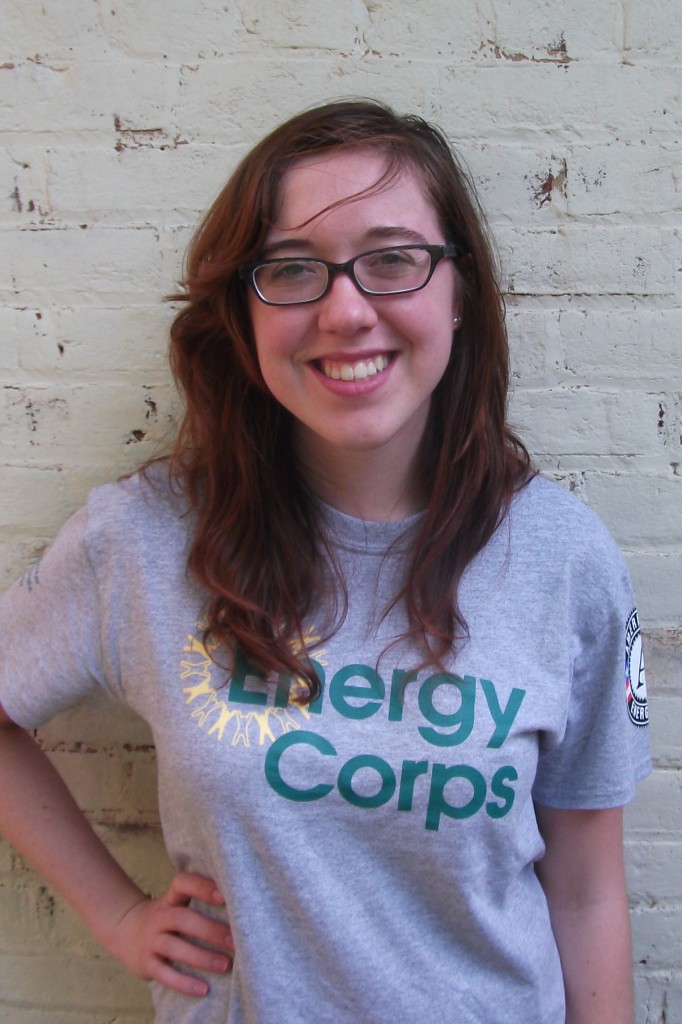Last month, I traveled with the director of the Applied Sustainability Center down to Gould, Arkansas. For those of you not familiar with our state, Gould is a small farming community south of Little Rock with a population of around 800. As part of the Sustainable Energy Scorecards and Education for Municipalities (SESEM) program, we give presentations on the role of energy efficiency in economic development for both city and business professionals and the public. By highlighting the economic benefits of energy efficiency measures, we hope to reach an audience that may be unmotivated by arguments for conservation and instigate economic growth in the green jobs sector. Energy efficiency efforts could have a major impact in Gould, where the median household income is around $19,000.
After getting a little lost, we found the community center, which was located in an old bank building. Our audience consisted of the mayor and six city workers. Weeks before hand, I had created a PowerPoint showing all the economic reasons why energy efficiency makes economic common sense. Facts like: The ACCEEE estimates the potential savings through energy efficiency in Arkansas at 37% in the residential sector alone. That could theoretically be $626,706,000 in savings.
Before we started the presentation, however, the mayor shared some words with the group. He spoke of how his mother’s electricity bills had put a lot of financial pressure on her, since she retired. Wanting to help, he went around her house and replaced all of her incandescent bulbs with CFL light bulbs. That simple act significantly reduced her monthly bills and provided her with better lighting at night as well. Around me, I could see people nodding in agreement.
After the mayor’s speech, we mostly ditched our PowerPoint. Instead, the director spoke about her own family’s journey to make their 1951 home more energy efficient. Through their efforts, they have managed to cut their energy bills in half from their average monthly rates in 1998. We talked about low cost, easy methods to weatherize homes. We showed how homes in Gould were using 8.9 kWh per square foot, while Fayetteville used 7.9 kWh per square foot. In short, we made our presentation accessible and personal.
Using numerical evidence can be an extremely useful way to show people the economic benefits of sustainability. However, I think that it is even more effective when you also use personal stories to drive your message home. When people connect emotionally to an issue, the information sticks with them. I’m very thankful that the mayor shared his experience with the group that day. It reminded me again what a huge effect sustainability can have on a community, and how powerful it can be to look at the local impact of global issues.
 Elana Harrison is a recent graduate of Hendrix college with a major in International Relations and a Minor in German. She discovered a love for environmental policy while working with the Sierra Club’s Beyond Coal Campaign. She also worked as an intern with the Arkansas Public Policy Panel, where she tracked environmental, energy, and water-related policy during the 2013 session. Eland will be placed at the University of Arkansas’s Applied Sustainability Center, working on creating Energy Scorecards for municipalities around the state. She will work with eight cities in Arkansas to assist with strategic energy planning as well as energy outreach and education.
Elana Harrison is a recent graduate of Hendrix college with a major in International Relations and a Minor in German. She discovered a love for environmental policy while working with the Sierra Club’s Beyond Coal Campaign. She also worked as an intern with the Arkansas Public Policy Panel, where she tracked environmental, energy, and water-related policy during the 2013 session. Eland will be placed at the University of Arkansas’s Applied Sustainability Center, working on creating Energy Scorecards for municipalities around the state. She will work with eight cities in Arkansas to assist with strategic energy planning as well as energy outreach and education.








